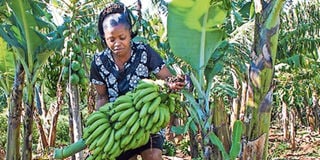AgriBiz programme to create jobs for youths and women

A farmer carries a harvested bunch of bananas. The Kenya Climate Innovation Centre (KCIC) has rolled out AgriBiz, a Sh5.1 billion five-year programme that specifically targets women and the youth in the crops and livestock value chains. PHOTO | FILE | NATION MEDIA GROUP
What you need to know:
- The economic disruption is immense, with revenue projections lowered and the government scaling down on spending as revealed in the latest budget policy statement.
- In a move that gives a lifeline to the sector, the government in March classified food dealers, distributors, wholesalers and transporters of farm produce as critical and essential service providers, who are exempted from the nationwide curfew.
- Financed by the European Union and Danida (the Danish Cooperation), the programme will seek to address pertinent issues that block the youth and women from venturing into agribusiness.
- The roll-out of the programme is timely and will contribute to continuity of productivity in the sector while providing employment opportunities to those who need them the most.
The Covid-19 contagion has disrupted various sectors in an unprecedented manner in Kenya.
At no time in modern history has the country faced a health crisis of such a magnitude, with devastating social and economic impact.
Movement has been restricted, livelihoods have been disrupted, sections of the country are in partial lockdown, working from home is the new normal while the future looks uncertain.
The economic disruption is immense, with revenue projections lowered and the government scaling down on spending as revealed in the latest budget policy statement.
In the agriculture sector, of immense concern are the numerous restrictions the virus has placed on production and supply chains.
Agribusiness value chains are facing serious headwinds that have led to a slowdown in productivity.
This threatens not only sources of livelihood for millions, but also the nation’s food security. It is, however, reassuring that the noble place the sector occupies has not missed the eye of policy actors.
In a move that gives a lifeline to the sector, the government in March classified food dealers, distributors, wholesalers and transporters of farm produce as critical and essential service providers, who are exempted from the nationwide curfew.
To ensure the much-needed continuity in the agribusiness sector, the Kenya Climate Innovation Centre (KCIC) last week rolled out AgriBiz, a Sh5.1 billion five-year programme that specifically targets women and the youth in the crops and livestock value chains.
Financed by the European Union and Danida (the Danish Cooperation), the programme will seek to address pertinent issues that block the youth and women from venturing into agribusiness.
It does not bode well that anything agricultural is perceived as a realm of the older generation or retirees. The Ministry of Agriculture puts the average age of a Kenyan farmer at 60 and that of the consumer at 17.
NEGATIVE PERCEPTION
Other underlying issues include restricted access to factors of production, including natural resources and affordable finance.
Many traditional land tenure systems recognise the eldest male member of the family as the custodian of family land.
This limits women and the youth from accessing finance from traditional lenders, who require land title deeds as security.
Additionally, such lenders deem agribusiness ventures as too risky to invest in. The youth are also viewed as a too risky cohort to trust with money. As such, women and the youth’s ability to invest in developing land is greatly curtailed.
AgriBiz also seeks to turn the tide on the negative perception of agribusiness initiatives as ventures riddled with low returns.
Beneficiaries will be trained on how to tap into the immense opportunities presented in agricultural value chains for them to create employment, increase household incomes and contribute to efforts towards food security. The idea is to enable them view agribusiness as gainful employment.
The programme will be implemented jointly with eight county governments where incubation hubs will be set up. These are Kilifi, Machakos, Kiambu, Meru, Isiolo, Kisii, Bungoma and Uasin Gishu.
Some 2,400 women and youth-led agribusinesses will benefit from the initiative. The enterprises are expected to create 17,000 job opportunities and Sh17.6 billion in loans will also be leveraged from local financial institutions to support the enterprises.
The roll-out of the programme is timely and will contribute to continuity of productivity in the sector while providing employment opportunities to those who need them the most – women and the youth.
As Kenyans weather the coronavirus crisis, this initiative is a reminder that we need to look at the future with renewed hope.
The writer is based at the Kenya Climate Innovation Centre




